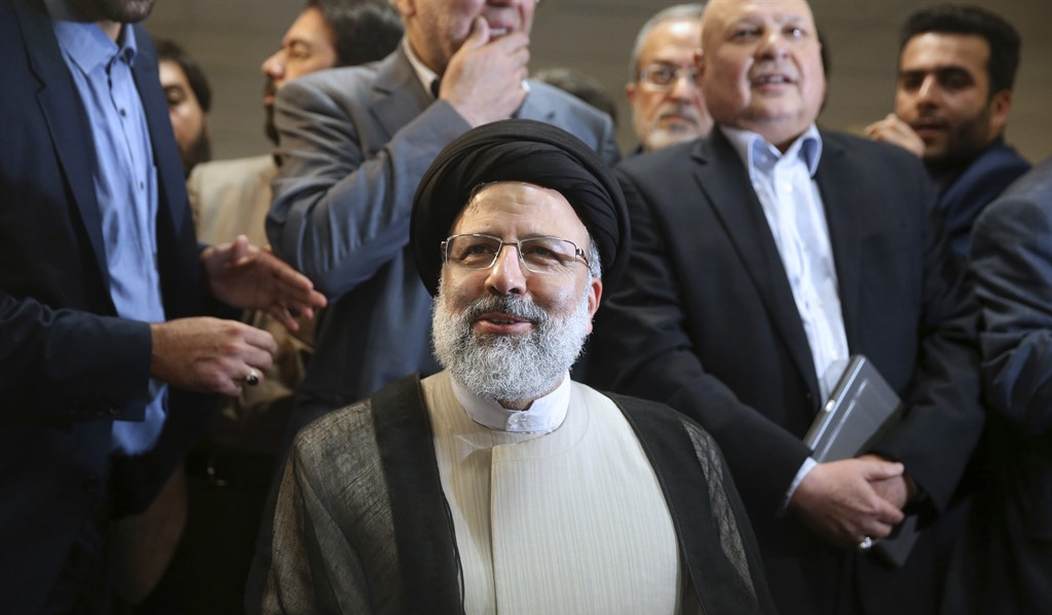Faced with unprecedented international isolation, economic hardship, social revolt, and an increasingly hostile relationship with regional powers, Iran’s supreme leader and permanent head of state, Ayatollah Ali Khamenei, put a final nail in the Islamic Republic’s power sharing coffin this month by backing a hardline regime insider with a murderous reputation for president.
In his first press conference, Ebrahim Raisi, the new president-elect and former Chief Justice vowed to continue diplomatic talks on the nuclear issue while making a push for relief from sanctions imposed by the global community to contain the regime’s malign nuclear pursuits.
That six prior rounds of talks between China, Russia, France, the United Kingdom, plus Germany, also known as the P4+1, and the United States have yet to deliver tangible results is hardly surprising to astute observers.
What is unusual is the Biden administration’s seeming eagerness to rejoin nuclear negotiations when Iran’s authorities have little more than the specter of proxy violence and the threat of war as leverage to motivate U.S. participation and virtually nothing to generate concessions.
Scaling back sanctions and returning to Obama era nuclear commitments would constitute a significant defeat for an American president who has shown an inclination for the cause of liberty, championed human rights, and demonstrated distaste for authoritarianism.
To advance U.S. security interests, the White House must come to terms with a singular reality: Tehran’s theocratic rulers will never abandon their nuclear aspirations.
The tired talking points espoused by Iran's mouthpieces In Washington notwithstanding, the regime’s nuclear program is not about “national pride” or “domestic scientific achievements.”
It’s a security guarantee.
Khamenei argued on his website that Libya’s leader, Muammar Gaddafi, made a fatal mistake by prematurely dismantling his nuclear program and paid a steep price for it. What he did not write but knows all too well is that North Korea concealed its nuclear program long enough to effectively bully world powers into accepting it as a foregone conclusion.
Recommended
Indifferent to the IAEA’s cameras or any attempts at nuclear oversight, Iran has shown no indications it plans to abandon its illicit nuclear pursuits. Iran’s Minister of Intelligence, Mahmoud Alavi, likely intended to convey a threat when he told Iranian state television that “a cornered cat may behave differently from when the cat is free.”
What he failed to acknowledge is that cats with no claws are less destructive.
U.S. officials must begin to accept that – no matter how many treaties are signed, or deals are cut – Iran’s diplomacy serves its military interests and security operations, not peace or stability. Middle East policy is dictated by IRGC-Quds Force, not moderates, reformers, or pragmatists.
Audio recordings of Iran’s Foreign Minister, Javad Zarif, leaked just weeks before the election put a spotlight on the deepening divisions between senior figures in the regime’s power structure and acknowledged how little influence even he held in diplomatic affairs.
President Rouhani’s willingness this month to publicly criticize the 2016 assault on the Saudi Embassy in Tehran that resulted in Riyadh severing diplomatic relations with Tehran by calling it a “childish and stupid” action – and going so far as to curse the perpetrators – signaled yet another crack in the Islamic Republic’s foundation.
With hardliners now controlling virtually every lever of power in Tehran, U.S. officials must acknowledge that the region is poised for more crises and worsening violence in the year ahead. As Khamenei tells his followers often: “If we don’t fight in Damascus, we have to fight in Tehran.”
It’s highly unlikely that Raisi will change the Supreme Leader’s strategic worldview, particularly not when his election this month was all but delivered by the lifetime office holder.
Serious observers understand that Raisi does not have 17 million supporters in Iran. The People’s Mojahedin Organization of Iran, also known as the MEK – the organization that exposed the clandestine nuclear program in 2002 based on 1,200 reporters and 3,500 video clips from deserted polling stations in 400 cities throughout country – reports that less than 10 percent of the population showed up in polling stations on June 18. The high volume of invalid votes also demonstrates that not everyone who did turn out even favored the regime’s candidates.
In fact, in the weeks before the election, parents of slain protesters in recent uprisings uploaded social media footage calling for regime change by the Iranian people – actions that resulted in politically inspired graffiti and the burning of candidates’ banners all over Iran.
If the Islamic Republic’s 2021 presidential elections demonstrated anything it signaled that a new wave of protests is imminent, and that the population is restive.
With the 2021 Free Iran World Summit, a global forum hosted by the National Council of Resistance of Iran (NCRI), less than two weeks away, the global community will have an opportunity to witness senior lawmakers, former government officials, and prominent individuals from around the world gather to express support for a free and democratic Iran that is at peace with regional powers and the global community. The event, which will take place from July 10-12, will be the largest virtual gathering in support of freedom and democracy this year.
Even more importantly, by broadcasting live inside Iran on three satellite stations and the Internet, ordinary Iranians will see what they could not find at the ballot box: hope for a brighter, more prosperous, and peaceful future and a viable alternative to despotic rule.























Join the conversation as a VIP Member